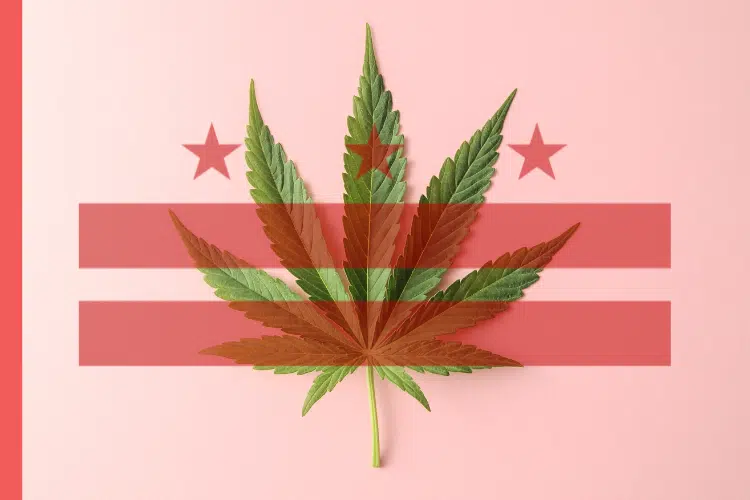The Highs and Lows of Legal Weed in Washington D.C.

In 2014, Washington D.C. legalized the possession of small amounts of marijuana for personal use, making it one of the first jurisdictions in the United States to do so. The law allowed individuals over 21 to possess up to two ounces of marijuana and grow six plants in their homes. However, the sale and purchase of marijuana remained illegal, leading to a complex regulatory environment with highs and lows for the burgeoning legal weed industry.
The Highs:
One of the most common questions people have about marijuana legalization in Washington D.C. is whether smoking weed in the city is legal. The answer is that while it’s legal to possess and consume small amounts of marijuana in private, smoking in public is still prohibited.
So, is it legal to smoke weed in DC? Yes, it is legal to smoke weed in DC, but only in private. Smoking in public places like parks, sidewalks, or public transportation is still against the law.
The legalization of marijuana in Washington D.C. has had several positive effects on the city. One of the most notable is the reduction in arrests for marijuana-related offenses. Before legalization, marijuana possession was a criminal offense, and many people were arrested and charged for it. However, since the law was passed, the number of arrests has dropped dramatically, which has reduced the burden on the criminal justice system and saved taxpayers money.
Another benefit of legalization is the creation of a legal market for marijuana. While the sale and purchase of marijuana are still technically illegal in Washington D.C., the law allows individuals to give up to one ounce of marijuana as a gift to another adult. This has led to a thriving market for marijuana “donations,” where individuals can exchange money for other goods or services and receive marijuana as a gift.
The legalization of marijuana has also provided a significant economic boost to Washington D.C. According to a report by the Marijuana Policy Project, legalizing marijuana could generate up to $130 million in tax revenue for the city each year. This revenue could be used to fund public services and social programs, improving residents’ overall quality of life.
In summary, while it is legal to possess and consume small amounts of marijuana in private in Washington D.C., smoking in public is still prohibited. Nonetheless, the legalization of marijuana has had several positive effects on the city, including reducing arrests, creating a legal market for marijuana “donations,” and providing an economic boost.
The Lows:
Despite the positive effects of legalization, several challenges have been associated with the legal weed industry in Washington D.C. One of the biggest is the lack of a legal market for marijuana. While individuals can possess and give away small amounts of marijuana, they cannot legally buy or sell it. This has led to a gray market where individuals can purchase marijuana “donations” from unlicensed sellers, which can be risky for both buyers and sellers.
Another issue with the current regulatory environment is the lack of clear guidelines for cultivating and selling marijuana. While individuals can grow up to six plants in their homes, there are no regulations to ensure that these plants are grown safely or that the resulting marijuana is free of contaminants. Additionally, there are no regulations governing the sale of marijuana “donations,” which can lead to inconsistencies in quality and pricing.
Finally, the federal government’s continued prohibition of marijuana has created significant challenges for the legal weed industry in Washington D.C. While the city has legalized marijuana, it remains illegal under federal law, which has limited access to banking services and made it difficult for businesses to operate. Additionally, federal law enforcement agencies could still choose to prosecute individuals or businesses engaged in the sale or cultivation of marijuana, despite the city’s legalization efforts.
Conclusion:
The legalization of marijuana in Washington D.C. has positively and negatively affected the city. While it has reduced arrests and provided an economic boost, the lack of a legal market and clear regulations has created challenges for the legal weed industry. Additionally, the federal government’s continued prohibition of marijuana has limited access to banking services and created uncertainty for businesses operating in the industry.
Moving forward, it will be important for Washington D.C. to address these challenges and create a clear regulatory environment for the legal weed industry. This could include creating a legal market for marijuana, implementing regulations for cultivation and sale, and working with federal lawmakers to address the ongoing conflict between state and federal law. With the right policies in place, the legal weed industry in Washington D.C. can potentially provide significant benefits to the city and its residents. It could create jobs, generate tax revenue, and provide access to safe and regulated marijuana products for adults who choose to use them.
Additionally, Washington D.C. could serve as a model for other jurisdictions looking to legalize marijuana. By addressing the challenges associated with legalization and creating a clear regulatory environment, the city could demonstrate that legalizing marijuana can be a responsible and effective policy choice.
Overall, the highs and lows of legal weed in Washington D.C. highlight the complex nature of marijuana legalization. While it can provide significant benefits, it also requires careful planning and regulation to ensure that it is implemented in a safe and effective manner. With the right policies in place, however, legal weed has the potential to improve the lives of residents and provide a significant boost to the local economy.




























